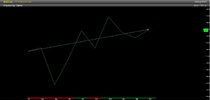- Joined
- 28 December 2013
- Posts
- 6,392
- Reactions
- 24,319
Trading this financial year is going great
If you are not making money trading the Australian markets this financial year, it is important to ask yourself why. To be profitable, traders need to have a well-defined trading strategy, with clear entry & exit points that are crucial for successful trading. As a trader, it's essential to approach every trade as an opportunity to learn & improve your performance.
While losses are a natural part of the trading process
It's important to have a precisely designed exit strategy to manage those positions effectively & not let them spiral out of control. In short, every trade offers you the opportunity to learn & grow as a trader, it's so crucial to manage your losses effectively & adjust your approach as needed to stay ahead of the curve. By doing so, you can become a more successful trader.

Skate.
If you are not making money trading the Australian markets this financial year, it is important to ask yourself why. To be profitable, traders need to have a well-defined trading strategy, with clear entry & exit points that are crucial for successful trading. As a trader, it's essential to approach every trade as an opportunity to learn & improve your performance.
While losses are a natural part of the trading process
It's important to have a precisely designed exit strategy to manage those positions effectively & not let them spiral out of control. In short, every trade offers you the opportunity to learn & grow as a trader, it's so crucial to manage your losses effectively & adjust your approach as needed to stay ahead of the curve. By doing so, you can become a more successful trader.

Skate.
